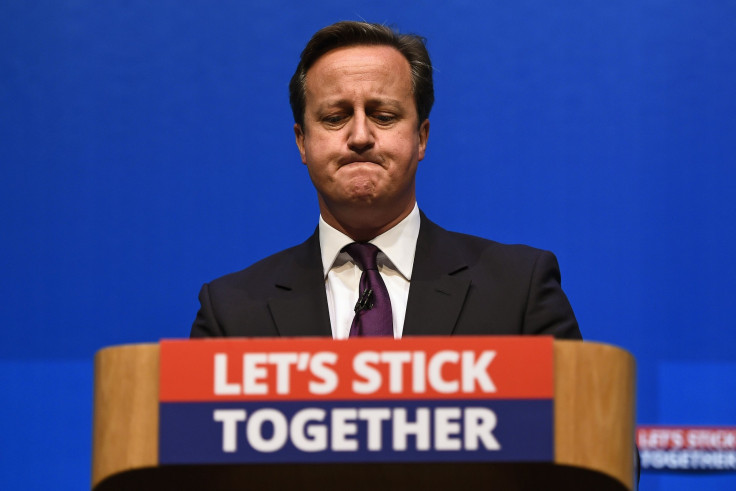Scotland Referendum: David Cameron Feeling The Heat As Vote Nears

British Prime Minister David Cameron has spent much of the last two weeks campaigning in Scotland, trying to convince Scots to stay in the United Kingdom and vote "No" in Thursday’s independence referendum. Many Scots haven’t paid much heed, largely because Cameron was never very popular in Scotland to begin with and he embodies everything many Scots think is wrong in Westminster.
Cameron made his last visit to Scotland before the vote on Monday. Cameron acknowledged his own and his government’s unpopularity amongst Scots, but tried to actually use it to bolster the No campaign.
"Don’t think: I’m frustrated with politics right now, so I’ll walk out the door," Cameron said. "If you don’t like me, I won’t be here forever. If you don’t like this government, it won’t last forever. But if you leave the UK, that will be forever."
Cameron’s Conservative Party is incredibly unpopular in Scotland, holding just one of the 59 Scottish seats in the House of Commons. Many Scots criticize Cameron and other English politicians of all parties for paying attention to them only when it's in their own interests. Cameron has always been pro-Union, but his recent surge in campaigning comes only after polls showed there was a real chance of Scotland choosing to leave the UK.
The prime minister has become the face of the pro-Union camp for better or for worse, and the English are likely to blame him for “losing” Scotland if the Yes vote prevails on Thursday, which could hurt his Tories in next year's scheduled general election. Welsh MP Jonathan Edwards accused Cameron earlier in September of displaying “an arrogant” mentality by refusing a “devo-max" option on the referendum ballot, which would give Scotland more power over its governance but keep it a part of the UK. Edwards says that could have convinced many Scots to stay, but now they must choose all in or all out.
“The prime minister should have agreed to a third question on devolution max, which had stratospheric approval ratings at the time,” Edwards said. “The union would be safe for the sake of swallowing some pride. However, hubris and an arrogant ‘How could they possibly want to do things differently?’ mentality prevailed instead.”
Instead, Cameron waited until this month to offer concessions, which include major elements of devo-max, but for many Scots who have warmed to the idea of independence it could be too late. By giving Scots the stark choice of “no change” or “independence,” Cameron and the rest of Westminster now find themselves in danger of breaking up the 307-year-old UK.
Cameron has a 37 percent approval rating countrywide, according to the latest polls. The Labour Party has pulled ahead of Cameron’s Conservatives by eight points, the largest margin in seven months. Losing Scotland could be a severe blow to the Conservatives, but would hurt Labor as well since it would lose more MPs.
Scots don't really want him around and depending on Thursday's referendum, maybe the English won't either. One plane ticket for Catalonia, Spain, David?
© Copyright IBTimes 2024. All rights reserved.












